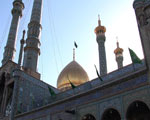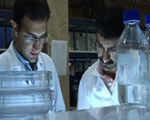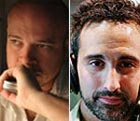|
| ||||||||||||||||||




Rough Cut
| ||||||||||||||||||
|
Iran's Juvenile Executions
Asieh Amini's journey from poet and writer to fearless campaigner for human rights in Iran.  Neil Katz is a multimedia reporter and field producer for the CBS News show 48 Hours. Jonathan Schienberg is an associate producer with the CBS news magazine series 60 Minutes and a multimedia news producer. Both reporters are graduates of the Columbia School of Journalism.
Editor's Note: As the June 12 presidential election nears in Iran, candidates there, including incumbent Mahmoud Ahmadinejad, continue to debate Iran's hard line stance toward the West. Most Iranians agree, however, that the real power in Iran lies with its conservative religious leaders. So, when FRONTLINE/World correspondents Neil Katz and Jonathan Schienberg recently traveled there, they were surprised to find a theocracy nurturing scientific research that has proved far more controversial to advance in the U.S. While American headlines about Iran barely get beyond religious extremism and nuclear bombs, on a visit there recently, my reporting partner Neil Katz and I discovered a more unusual pairing: religious devotion and medical science. This staunchly conservative theocracy has become a hub of world-class research in embryonic stem cell science.
In 2002, Grand Ayatollah Ali Khamenei created a "stem cell fatwa" declaring experimentation with human embryonic stem cells consistent with Shiite Islam and encouraging scientists to advance the technology to save lives. Through embryonic stem-cell science, and other work being done at the Royan Institute in Tehran (the country's premiere science center), Iran is once again becoming a leader in the scientific world. It's a throwback to 1700 years ago, when the Persian Empire was the center of the scientific universe. In 2005, Iranian scientists implanted human embryonic stem cells into paralyzed rats and released results that the rats were able to walk again. A year later, they cloned a sheep. And now, similar to research being done in the West, they are trying to find safe ways to transform adult cells into embryonic cells. Despite these efforts, scientists there told us that the path to progress is not easy. A 30-year American embargo has made scientific supplies and technology scarce. Some machines, which Western scientists have been using since the 1950s, are still not available in Iran. In 2002, Grand Ayatollah Ali Khamenei created a "stem cell fatwa" declaring experimentation with human embryonic stem cells consistent with Shiite Islam and encouraging scientists to advance the technology to save lives.
Opportunities for Iranian scientists to collaborate with the West are also limited. When scientists are invited to share their research in America, Homeland Security often turns them down. Similarly, invitations to Iranians to study in the U.S. are often slowed or blocked by the U.S. government. When Iranian institutes have reciprocated offers, few American scientists have been brave enough to accept. Scientists at Royan told us that the National Institute of Health has advised U.S. professors not to accept invitations to attend their conferences. While there's progress in the labs, on the streets, peoples' dress and behavior are constantly monitored. In Tehran, we watched the "Moral Police," brought back by Iranian president Mahmoud Ahmadinejad, harass women who were not wearing their headscarves "correctly." We were also constantly harassed ourselves trying to film on the streets. At one point, we were taken into police custody where officers grilled us and threatened to confiscate our tapes. Many people told us, "Be very careful. You are being followed by government spies." And others warned that the fixer agency we had hired to help us get around in Iran was really just a front for the Revolutionary Guard. Paranoid delusions? We never knew for sure. -- Jonathan Schienberg
| ||||||||||||||||||
|
(anonymous) Winston Smith - Dallas, TX Hasanayn - Chicago, IL (anonymous) david raynor - genesee, idaho Jon Vaughn - Los Angeles, Ca port charlotte, florida (anonymous)
| ||||||||||||||||||
![FRONTLINE/World [home]](/was/20100322163935im_/http://www.pbs.org/frontlineworld/images/blank.gif)
